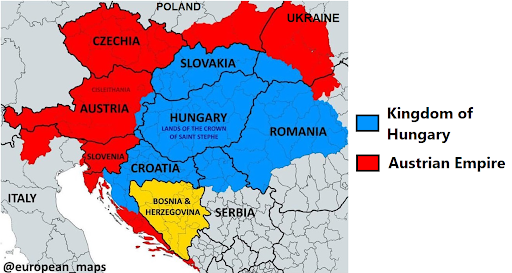Are your parents, grandparents or even great-great grandparents Hungarian? If so, an A-grade European passport could be within easy reach. In today’s episode, we explore Hungary’s Citizenship By Ancestry Program and how you can benefit…
Join Sovereign Confidential to…
Hungary is one of Europe’s best-kept secrets. It is renowned as an international travel destination, and over the decades its capital, Budapest, has been the setting for scores of movies and novels. The country also boasts an attractive corporate tax rate (9%), and an exceptionally low cost of living.
Sure, it lacks the ocean views and balmy climes of Southern Europe. But Budapest is one of the prettiest cities on the continent, and can easily rival Vienna or Paris – especially when you factor in the low cost of living.
Given the country’s many benefits and attractions, Hungary is cheap. Moving here can save you thousands of dollars in living costs, and the country is strategically located within the EU and Schengen Area.
As an added benefit, the country’s Citizenship By Ancestry program means that it is a viable Plan B destination for around five million people of Hungarian origin around the world.
The Hungarian Citizenship By Descent Program at a Glance
According to Section 4 (3) of the Hungarian Citizenship Act, introduced in 2011, Hungary now permits you to claim your Hungarian citizenship through ancestry.
There is no limit on the number of generations you can look back on, and unlike in, say, Bulgaria, the actual ethnicity of your ancestor is irrelevant.
All you need to prove is that your ancestor was once a citizen of Hungary. And considering that Hungarian borders shifted a lot during the 20th century, this may apply to many people.
Let’s start with the fact that until 1920, Hungary was part of the much larger Austro-Hungarian Empire.
The division between these two areas was always strict – there wasn’t one common citizenship. So you were either an Austrian or a Hungarian citizen, but never both.

Austria-Hungary with its modern-day borders.
As a result of World War I, and being on the losing side of the conflict, Hungary had lost two-thirds of its territories by 1920.
Today, former Hungarian territories are part of eight other countries: Austria, Croatia, Hungary, Romania, Serbia, Slovakia, Slovenia, and Ukraine.
Anyone who lived in the “blue territory” was likely a citizen of the Kingdom of Hungary. And if you descend from such a person, you can claim your Hungarian citizenship.
When exactly your ancestor had left Hungary is not critical, although vital records from the 19th century and earlier can be much more challenging to locate.
Additionally, hundreds of thousands of Hungarians fled the communist regime established in the country in 1949 and lost their citizenship as a result. But now, their descendants can also claim their Hungarian citizenship back.
Today, more than five million ethnic Hungarians live outside of Hungary, mostly in the nearby countries, but also overseas. Around 1.4 million Americans identify themselves as Hungarians.
However, with the Hungarian program, you shouldn’t focus on ethnicity. Your ancestor could have been, say, Romanian ethnically, but if they once were a citizen of the area that constituted the Kingdom of Hungary at the time, you should qualify.
Such relatively relaxed requirements and a vast span of eligible territories have made the Hungarian ancestry program a real hit. Since its enactment in 2011, more than a million people – 10% of the country’s population – became Hungarians through it.
While most of the applicants came from nearby countries, Americans, Canadians, Australians, Argentineans, etc., have also been on the extensive list of applicants.
Hungary’s liberal stance towards dual citizenship is another reason for its Citizenship By Ancestry program’s success. Hungarians are allowed to hold more than one passport.
Proving that you have ancestral ties to Hungary requires the usual pile of documents.
NOTE: Sovereign Confidential members, be sure to consult the latest installment of our Citizenship By Ancestry Black Paper to obtain step-by-step process information, the exact documentary requirements, as well as the contact details for vetted legal service providers on the ground.
Once you have the necessary documents, the citizenship application can then be submitted at your local Hungarian consulate, or directly in Budapest.
Once you’ve applied, the citizenship assessment takes approximately 6 to 12 months.
Important – there is also a written test involved. It’s in Hungarian, and the topics are about the Hungarian Constitution and Hungarian history. Brochures are available if you want to memorize the answers in advance.
Additionally, there will be a short spoken language assessment, where you will need to speak at least basic Hungarian about everyday topics and your family.
The language requirement sets the Hungarian Citizenship By Ancestry program apart from most other programs we have covered thus far. It also doesn’t help that the Hungarian language is one of Europe’s hardest, with no linguistic connection to other European languages.
On the bright side, a modest level of knowledge should be enough; just enough for you to be able to discuss your family’s history and your biography.
Speaking of your family members, your kids of any age will also be able to apply for Hungarian citizenship, but only after you become Hungarian yourself. But if your child is over 18 years of age, they will also need to prove their knowledge of the Hungarian language and pass the Hungarian Constitution and history test.
As for your spouse, they will not get any preferential treatment. At the same time, the standard naturalization rules are quite generous, too. The spouse of a Hungarian citizen can apply for naturalization after being married for:
- 3 years, if residing in Hungary;
- 10 years, if residing outside of Hungary;
- 5 years, if residing outside of Hungary, but they’ve had a child together.
So, your spouse could potentially be clocking their time-until-naturalization in Boston instead of Budapest. And if you have a child together, the timeline is only five years, which is not a bad deal.
That being said, our contact on the ground tells us that the timer only starts from the moment you become a Hungarian citizen yourself, even if you have been married long before that.
And just like your adult kids, your spouse will need to pass the language and history tests.
The bottomline
While the Hungarian program’s language requirement is a unique and relatively onerous one, we still believe that the additional effort required is more than worth it, given the strength of the Hungarian passport, and the affordable quality of life you can enjoy in the country.
And as always, if you’re eligible for the program, take action and apply today.








